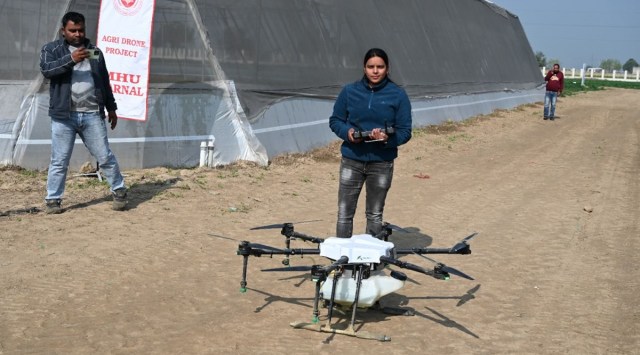In Haryana’s farms, the latest buzz: drones that spray fertiliser, pesticides
These unmanned aerial vehicles are now the machines of choice for farmers in Haryana who are using them for spraying liquid fertilisers and pesticides to undertake surveys to check for any crop damage.
 Nisha Solanki, Haryana’s first certified drone pilot
Nisha Solanki, Haryana’s first certified drone pilot Much-maligned in Punjab where they are mostly in news for dropping drugs and arms after flying in from Pakistan, drones have found a fresh lease of life in neighbouring Haryana where they are being hailed as next big thing in the agriculture sector.
These unmanned aerial vehicles are now the machines of choice for farmers in Haryana who are using them for spraying liquid fertilisers and pesticides to undertake surveys to check for any crop damage.
Such is the interest in this emerging technology among farmers that the Haryana government is now planning to create an army of 1,000 drone pilots.
Highly placed official sources told The Indian Express that a process has been initiated to engage a firm to train youth and staff members of agriculture department to fly the drones over the agricultural fields and spray pesticides and liquid fertilisers.
An officer of Haryana agriculture and farmers welfare department said: “We don’t want to stay behind in the use of this emerging technology. We will send a proposal to the Cerntre to offer 40 to 50 per cent subsidy to the farmers who are keen on buying drones for agricultural use. If we don’t get an approval from the Centre, the state government will consider offering the subsidy at its own level.”
Maharana Pratap Horticulture University (MHU)’s Associate Director (extension service) Dr Satyender Yadav says currently there are only 3,000 drone pilots and 450 instructors (who train the drone pilots) in the country. According to Yadav, the university too has also decided to set up a centre to train drone pilots.
“As many as 10-15 farmers approach us everyday to request for a demonstration of drone services at their fields. We undertake such demonstrations free of cost, but the farmers are ready to pay charges too for the same,” says Yadav.
According to Yadav, the university started undertaking demonstrations, with two drones, beginning September 2022 with a target to undertake the activity in 550 acres.
Nisha Solanki is one of the two pilots with the university. According to officials, she is the first certified drone pilot of Haryana securing the tag last year while pursuing MTech at Hisar’s Chaudhary Charan Singh Haryana Agricultural University. According to the university, Nisha had completed the training from a Directorate General of Civil Aviation (DGCA) Accredited Drone Operator.
Officials say a week-long training is required to become a drone pilot. Among the proposed 1,000 drone pilots, some will get training as instructors too to further train the farmers to operate the drones for agricultural activities.
A farmer from Hisar’s Ladwa village Vijay Sheoran says he bought two drones last year at the cost of Rs 8.5 lakh each. “We used the drones to spray liquid fertiliser in our wheat fields spread over 100 acres. Apart from this, we also undertook demonstrations in 200 acres in Hisar and neighbouring districts to popularise the use of drones. Later, we handed over the drones to a Gurgaon firm — from where we had bought them – for safekeeping till next crop season,” say Sheoran, 24.
According to Sheoran, drones can be very useful for spraying pesticides in cotton and sugarcane fields.
Sheoran, an MBA from Hisar’s Guru Jambheshwar University of Science and Technology, is one of te 40 members of an FPO (farmer producer organisation). Sheoran says: “Our drone has a capacity of loading of 11 kg material apart from its own weight of 25 kg. It takes just 7-10 minutes to undertake spray in one acre of land.”
Satyender Yadav adds: “Use of drones not only saves time but water too. During the manual spray there is need of 150 to 200 litres of water for a crop in an acre while drone can do the job with just 10 litres.”








